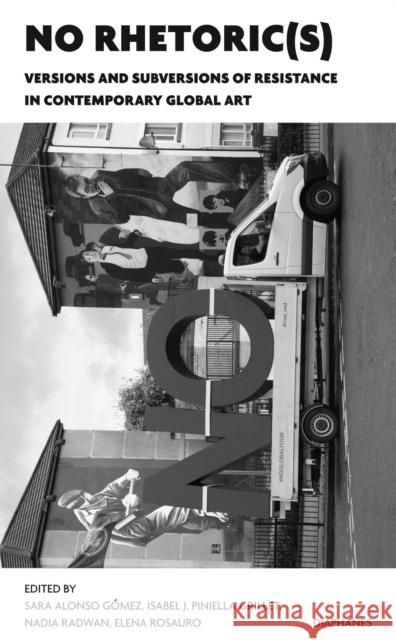


ISBN-13: 9783035802788 / Angielski / Miękka / 2023 / 328 str.
ISBN-13: 9783035802788 / Angielski / Miękka / 2023 / 328 str.
7 - 8 Acknowledgments9 - 22 NO Rhetoric(s): A Global Tour (Sara Alonso Gómez, Isabel J. Piniella Grillet, Nadia Radwan, Elena Rosauro)23 - 46 Critical Art: Towards a Concept of Artistic Disobedience (Sara Alonso Gómez)47 - 66 What is Art Able to? (Jaime Vindel)67 - 92 Withdrawing (and Returning): Refusal in Art Around 1968 (Charlotte Matter)93 - 104 LOVE, By Any Means Necessary (Kendell Geers)105 - 132 Art's Agency: On Being Flabbergasted (Mieke Bal)133 - 154 Impossible Architectures: Public Space, Affect, and Queer Artivism in Urban Mexico (David Tenorio)155 - 174 Art Resistance: The Body Against Neoliberal Life Management (Nancy Garín)175 - 198 Provocation, Resistance, and the Arts of Persuasion (Fiona Siegenthaler)199 - 214 Abstraction and the Concealed Rhetorics of Resistance (Nadia Radwan)215 - 226 Dear Colleagues: Dead or Alive, (Gelare Khoshgozaran)227 - 250 Rhetorics of Realism? Gaming Culture and Socially Engaged Art Practices (Katharina Brandl)251 - 272 Platform Resistance in the Age of Platform Capital (Ben Grosser, Geert Lovink)273 - 296 The Resistance of Peroles: Artistic Strategies Drenched in Oil (Isabel J. Piniella Grillet)297 - 314 Neoliberal Natures and non-Anthropocenic Art (Federico Luisetti)315 - 318 Is the Internet a Urinal? (Zach Blas)
Sara Alonso Gómez is associate professor in history and theory of contemporary art at Aix-Marseille University, as well as member of the Laboratoire d'études en Sciences de l'art (LESA) and the Latin American Center Zurich (LZZ). For more than a decade, she has developed interfaces between research, teaching, and curatorial practice, at the crossroads of three continents (the Americas, Europe, Africa). Her research on the heuristic tool of "artistic disobedience" allows for a better understanding of the relationship between art and politics on the threshold of the new millennium. It questions the potential for the insubordinate character of the work of art in the face of the injunctions of globalization. Alonso Gómez is the author of several scientific publications and co-curator for Yango II, Biennale of Contemporary Art in Kinshasa, Democratic Republic of Congo. Isabel J. Piniella Grillet is a postdoctoral researcher at the Institut d'Histoire du Temps Présent du CNRS, Paris 8, under the supervision of Frédérique Langue. Her current research focuses on Latin American Art, Official and Dissident Discourses, Memory and Affect. She previously obtained her doctoral degree at the Institute of History of the University of Bern as member of the Global Studies Program. She works in her dissertation book about political commitment within the cultural production of Venezuelan actors in the 1960s. Piniella studied Humanities with a major in Contemporary History and Philosophy at the Pompeu Fabra University and holds a Master's degree in Contemporary Philosophy from the Autonomous University of Barcelona. Since 2016 she is member of the Graduate School of the Arts and Humanities at the University of Bern and the Swiss School of Latin American Studies. She has been awarded with a scholarship in 2018 from the Deutscher Akademischer Austauschdienst, and in 2019 from the Dr. Joséphine de Karman Foundation. Elena Rosauro graduated in Art History and Theory from the Universidad Autónoma de Madrid (Spain), where she also completed an MA in Latin American Studies, with focus on Cultural Studies. Her PhD thesis History and Violence in Latin America. Artistic practices, 1992-2012 was published in 2017 by CENDEAC (Murcia, Spain). She has lived and worked in Madrid, Toronto, Munich and Zurich, where she is currently based. She is coordinator of the Latin American Center at the University of Zurich since 2018, and was associate postdoctoral researcher within the SNF-funded project "Contested Amnesia and Dissonant Narratives in the Global South: Post-conflict in Literature, Art, and Emergent Archives" led by Prof. Dr. Liliana Gómez from 2017 to 2021. She was secretary general of the Network on Latin American Visual Studies (ReVLaT, 2014-2020) and an elected council member of the Visual Studies Section of the Latin American Studies Association (LASA, 2017-2019). She has been guest lecturer in several universities both in Europe and Latin America, and published widely on contemporary Latin American art. She was founder and curator (2017-2021) of the independent art space and curatorial project la_cápsula in Zurich, which focuses on building bridges between the emerging Latin American and Swiss art scenes, with a strong emphasis on socially and politically engaged art. Nadia Radwan Nadia Radwan is Assistant Professor of World Art History at the University of Bern (Institute of Art History/Center for Global Studies). She has been a researcher and teacher at the American University in Cairo, the American University in Dubai and the University of Zurich. Her research focuses on Middle Eastern art and architecture in the nineteenth and twentieth centuries, non-western modernisms, Arab feminisms, nostalgia and orientalism, and the global museum. Her book, Les modernes d'Egypte was published in 2017 (Peter Lang) and she is currently finishing her second book about the aesthetics of resistance in global abstraction. She is the co-founder of Manazir: Swiss Platform for the Study of Visual Arts, Architecture and Heritage in the Middle East and the editor-in-chief of Manazir Journal: www.manazir.art.
1997-2026 DolnySlask.com Agencja Internetowa







